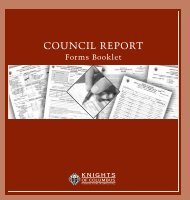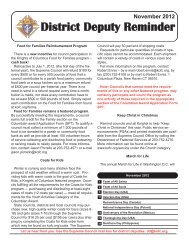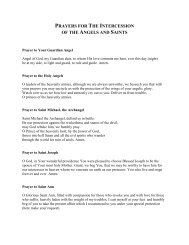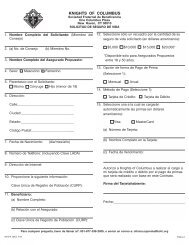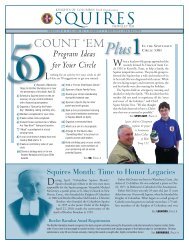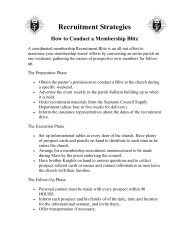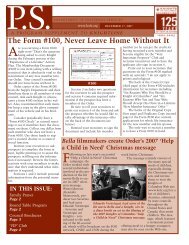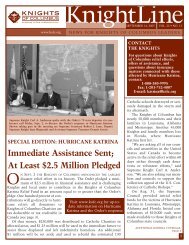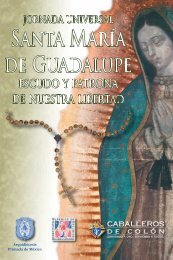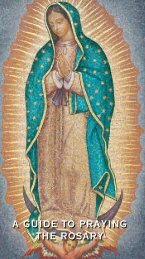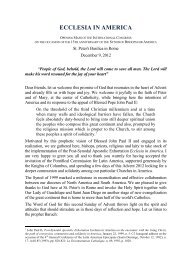CATHOLIC WORD BOOK - Knights of Columbus, Supreme Council
CATHOLIC WORD BOOK - Knights of Columbus, Supreme Council
CATHOLIC WORD BOOK - Knights of Columbus, Supreme Council
Create successful ePaper yourself
Turn your PDF publications into a flip-book with our unique Google optimized e-Paper software.
y nature. The scriptural basis <strong>of</strong> the<br />
doctrine was stated by St. Paul in 1 Cor<br />
15:21ff., and Rom 5:12 21. Original sin is<br />
remitted by baptism and incorporation in<br />
Christ, through whom grace is given to<br />
persons. Pope John Paul II, while<br />
describing original sin during a general<br />
audience Oct. 1, 1986, called it “the<br />
absence <strong>of</strong> sanctifying grace in nature<br />
which has been diverted from its<br />
supernatural end.”<br />
O Salutaris Hostia: The first three Latin<br />
words, O Saving Victim, <strong>of</strong> a Benediction<br />
hymn.<br />
Ostpolitik: Policy adopted by Pope Paul VI<br />
in an attempt to improve the situation <strong>of</strong><br />
Eastern European Catholics through<br />
diplomatic negotiations with their<br />
governments.<br />
Oxford Movement: A movement in the<br />
Church <strong>of</strong> England from 1833 to about<br />
1845 which had for its objective a<br />
threefold defense <strong>of</strong> the Church as a divine<br />
institution, the apostolic succession <strong>of</strong> its<br />
bishops, and the Book <strong>of</strong> Common Prayer as<br />
the rule <strong>of</strong> faith. The movement took its<br />
name from Oxford University and<br />
involved a number <strong>of</strong> intellectuals who<br />
authored a series <strong>of</strong> influential Tracts for<br />
Our Times. Some <strong>of</strong> its leading figures —<br />
e.g., F. W. Faber, John Henry Newman<br />
and Henry Edward Manning — became<br />
converts to the Catholic Church. In the<br />
Church <strong>of</strong> England, the movement<br />
affected the liturgy, historical and<br />
theological scholarship, the status <strong>of</strong> the<br />
ministry, and other areas <strong>of</strong> ecclesiastical<br />
life.<br />
P<br />
Paganism: A term referring to non<br />
revealed religions, i.e., religions other than<br />
Christianity, Judaism, and Islam.<br />
Palms: Blessed palms are a sacramental.<br />
They are blessed and distributed on the<br />
Sunday <strong>of</strong> the Passion in commemoration<br />
<strong>of</strong> the triumphant entrance <strong>of</strong> Christ into<br />
Jerusalem. Ashes <strong>of</strong> the burnt palms are<br />
used on Ash Wednesday.<br />
Pange Lingua: First Latin words, Sing, my<br />
tongue, <strong>of</strong> a hymn in honor <strong>of</strong> the Holy<br />
Eucharist, used particularly on Holy<br />
Thursday and in Eucharistic processions.<br />
Pantheism: Theory that all things are part<br />
<strong>of</strong> God, divine, in the sense that God<br />
realizes himself as the ultimate reality <strong>of</strong><br />
matter or spirit through being and/or<br />
becoming all things that have been, are,<br />
and will be. The theory leads to hopeless<br />
confusion <strong>of</strong> the Creator and the created<br />
realm <strong>of</strong> being, identifies evil with good,<br />
and involves many inherent<br />
contradictions.<br />
Papal Election: The pope is elected by the<br />
College <strong>of</strong> Cardinals during a secret<br />
conclave which begins no sooner than 15<br />
days and no later than 20 days after the<br />
death <strong>of</strong> his predecessor. Cardinals under<br />
the age <strong>of</strong> 80, totaling no more than 120,<br />
are eligible to take part in the election by<br />
secret ballot. Election is by a two thirds<br />
vote <strong>of</strong> participating cardinals. New<br />
legislation regarding papal elections and<br />
church government during a vacancy <strong>of</strong><br />
the Holy See was promulgated by Pope<br />
John Paul Feb. 23, 1996, in the apostolic<br />
-51-



